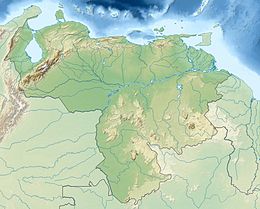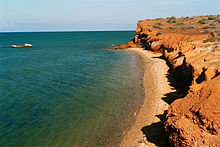| This article needs additional citations for verification. Please help improve this article by adding citations to reliable sources. Unsourced material may be challenged and removed. Find sources: "Coche Island" – news · newspapers · books · scholar · JSTOR (January 2021) (Learn how and when to remove this message) |
| Native name: Isla de Coche | |
|---|---|
 A beach of the island A beach of the island | |
  | |
| Geography | |
| Location | Caribbean Sea |
| Coordinates | 10°46′38″N 63°55′52″W / 10.77722°N 63.93111°W / 10.77722; -63.93111 |
| Area | 61 km (24 sq mi) |
| Length | 11 km (6.8 mi) |
| Width | 6 km (3.7 mi) |
| Highest elevation | 28 m (92 ft) |
| Administration | |
| Venezuela | |
| State | Nueva Esparta State |
| Municipality | Villalba |
| Largest settlement | San Pedro de Coche |
| Demographics | |
| Population | 8756 (2010) |
Isla de Coche (Coche Island) is one of three islands forming the Nueva Esparta State of Venezuela, located in the Caribbean between Isla Margarita and the mainland. The other two islands are Isla Margarita, the main island of the state, and Cubagua, the smallest. Coche is coterminous with the municipality of Villalba, with the municipal seat at San Pedro de Coche, the largest town. Moreover, Coche Island has continued to sustain the fishing tradition.
It covers an area of 55 km (21 sq mi) (11 km (7 mi) long by 6 km (4 mi)), with a population of about 8,200 (1999 census). The highest elevation of the island is 60 metres (197 ft) above sea level. The climate is tropical, with an average temperature of approximately 27 to 38 °C (81 to 100 °F).
Other towns on Coche besides San Pedro de Coche are El Bichar, Guinima, El Amparo, El Guamache, and La Uva. The economy depends mainly on tourism.
History
| This section does not cite any sources. Please help improve this section by adding citations to reliable sources. Unsourced material may be challenged and removed. (December 2022) (Learn how and when to remove this message) |
The island was discovered in 1498 by Christopher Columbus, populated by the Waika Rio indigenous people. First efforts to settle Coche was made in the early 16th century. There was previous population of refugees originating from the city of Nueva Cádiz which was destroyed by a tropical storm on Cubagua Island. All settlers, mostly the pearl daughters, abandoned Isla Coche in 1574.
The next successful settlement took place in the 19th century, and from this date Coche is still inhabited.

The island is contained as the municipality of Villalba, with both having San Pedro de Coche as their capital.

Airport
Location
City: Isla De Coche, Venezuela
Name: Andrés Miguel Salazar Marcano Airport
ICAO: SVIE
Details
Type: Airport (Aerodrome, Airfield)
Latitude: 10°47'40"N (10.794406)
Longitude: 63°58'54"W (-63.981589)
Datum: WGS 1984
Elevation: 10 ft (3 m)
Runways: 1
Longest: 3937 × 98 ft (1200 × 30 m)
Tourism
Coche Island is uniquely positioned for quality selective tourism (not massive). To the west of the island the conditions for windsurfing and kiteboarding (strong winds over 50 km/h with a sea without waves) and trucks candle can be cited among the best in the world. It can see the effect of strong winds and continued in the sparse vegetation of the island, as seen in the image of San Pedro de Coche. On the road can be practiced the cycling, naturally with sunscreen to prevent sunburn, given the absence of clouds over the year. The temperature, though high, is pleasant in the fresh sea air, considering that breeze rages precisely in the hottest hours of the afternoon.
On the island, there are good quality hotels that offer tourists all the necessary facilities for a pleasant stay. It also offers rides and tours both aquatic and terrestrial. Tourist purposes, Coche Island maintains close communication with Margarita Island and the Venezuelan mainland Sucre State.
In fiction
| This section does not cite any sources. Please help improve this section by adding citations to reliable sources. Unsourced material may be challenged and removed. (December 2022) (Learn how and when to remove this message) |
The story of the Polish writer Arkady Fiedler's novel "Robinson's Island" (Wyspa Robinsona, 1954) took place in Coche Island. The protagonist Jan (John) Bober, a half-Polish half-English Virginia pioneer, fled from government pursuit by a pirate ship. However it ran into heavy water and wrecked near the island. Jan and his two Arawak companions Arnak and Wagura (former slaves from the ship), the only survivors of the shipwreck, lived in 1725–1726 in the island. Later they received in the island a group of fled slaves from Margarita Island and with combined forces defeated Spanish slaver pursuers and seized their ship. Fearing Spanish revenge, Jan and his followers left the island on the captured ship. Their adventures continued in the two next Arkady Fiedler's novels "Orinoco" (Orinoko, 1957) and "The White Jaguar" (Biały Jaguar, 1980).
References
- ^ Coche Island, Venezuela in Geonames.org (cc-by)
- Maddicks, Russell (2011). Venezuela: The Bradt Travel Guide. USA: Bradt Travel Guides. p. 187. ISBN 978-1-84162-299-6.
- "Nueva Esparta | state, Venezuela". Encyclopedia Britannica. Retrieved 2020-11-09.
- The Editors of, Encyclopaedia Britannica. "Nueva Esparta". Britannica. Encyclopaedia Britannica. Retrieved 8 October 2020.
{{cite web}}:|last1=has generic name (help) - Buitrago, Joaquín; Rada, Martín; Hernández, Hernando; Buitrago, Esperanza (4 April 2020). "A Single-Use Site Selection Technique, Using GIS, for Aquaculture Planning: Choosing Locations for Mangrove Oyster Raft Culture in Margarita Island, Venezuela". Environmental Management. 35 (544–556(2005)): 544–556. doi:10.1007/s00267-004-0087-9. PMID 15886953. S2CID 43010580.
- "VenezuelaTuya". Venezuela Tuya. Retrieved 2020-11-09.
- Hofman, Corinne; Keehnen, Floris (2019-04-09). Material Encounters and Indigenous Transformations in the Early Colonial Americas: Archaeological Case Studies. BRILL. p. 147. ISBN 978-90-04-27368-9.
- Arnold, David (November 24, 2007). "Ta; Kiteboarding has taken off quite literally in the last five years, and the tiny island of Coche is considered the ultimate playground: [ONT Edition]". ProQuest.
- Blank, Dennis (1999-08-16). "A STRIP SEARCH WITH A TWIST". EBSCOhost.
External links
- (in English) Airport information